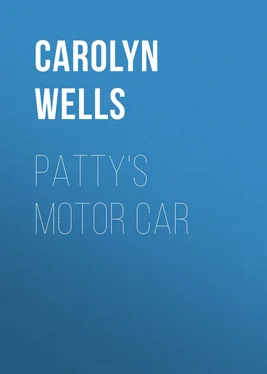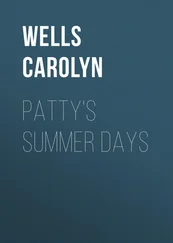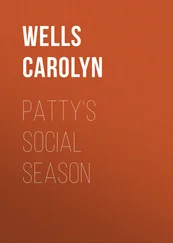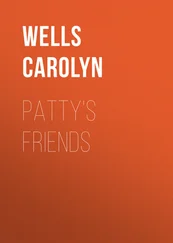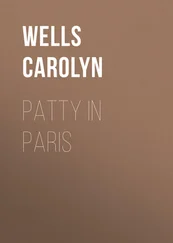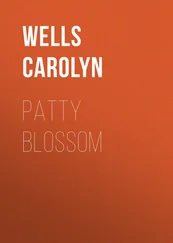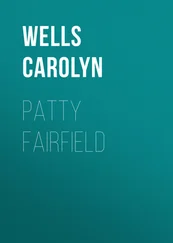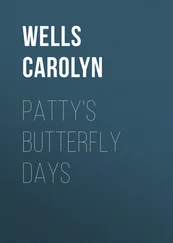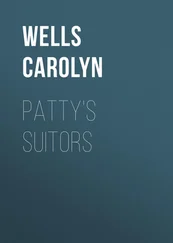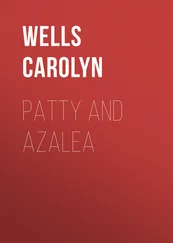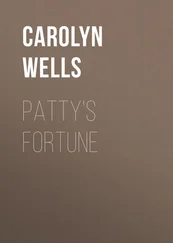Carolyn Wells - Patty's Motor Car
Здесь есть возможность читать онлайн «Carolyn Wells - Patty's Motor Car» — ознакомительный отрывок электронной книги совершенно бесплатно, а после прочтения отрывка купить полную версию. В некоторых случаях можно слушать аудио, скачать через торрент в формате fb2 и присутствует краткое содержание. Издательство: Иностранный паблик, Жанр: foreign_prose, на английском языке. Описание произведения, (предисловие) а так же отзывы посетителей доступны на портале библиотеки ЛибКат.
- Название:Patty's Motor Car
- Автор:
- Издательство:Иностранный паблик
- Жанр:
- Год:неизвестен
- ISBN:нет данных
- Рейтинг книги:3 / 5. Голосов: 1
-
Избранное:Добавить в избранное
- Отзывы:
-
Ваша оценка:
- 60
- 1
- 2
- 3
- 4
- 5
Patty's Motor Car: краткое содержание, описание и аннотация
Предлагаем к чтению аннотацию, описание, краткое содержание или предисловие (зависит от того, что написал сам автор книги «Patty's Motor Car»). Если вы не нашли необходимую информацию о книге — напишите в комментариях, мы постараемся отыскать её.
Patty's Motor Car — читать онлайн ознакомительный отрывок
Ниже представлен текст книги, разбитый по страницам. Система сохранения места последней прочитанной страницы, позволяет с удобством читать онлайн бесплатно книгу «Patty's Motor Car», без необходимости каждый раз заново искать на чём Вы остановились. Поставьте закладку, и сможете в любой момент перейти на страницу, на которой закончили чтение.
Интервал:
Закладка:
Carolyn Wells
Patty's Motor Car
CHAPTER I
AFTERNOON TEA
Patty was curled up in her favourite big easy-chair in her own study.
Though called a study, because it had been used as such during her schooldays, the pretty room was really more like a boudoir . Her desk was still there, but was now filled with programmes, friendly letters, and social correspondence instead of school themes or problems. The general colouring of the room was green, but the sash curtains of thin yellow silk, and the heap of yellow sofa cushions, did much to lighten the effect, and gave the room a sunshiny air, even on a dull day. The couch, and the two big, soft, cuddly chairs were upholstered in yellow-flowered chintz, and on the pale green walls hung Patty’s favourite pictures, and many curios or souvenirs of her year spent abroad.
It was the first of March, so the room was brightened both by a big bowlful of yellow daffodils and a blazing wood fire. The two things Patty liked best in life were warmth and colour, and so to-day she was sitting near the fire, with the splendid yellow glory of the daffodils in full view.
But she was not looking at them, for she was poring over a book. When Patty read she usually pored, for she was eager and enthusiastic over any story in which she was interested.
But to-day, she was not reading a story. She pored intently, and then, throwing back her head, she would stare blankly at the ceiling, thinking hard.
Then, perhaps, she would fly to her bookcase, tumble out two or three books, swiftly turn their pages, and then back to her big chair and the original book.
It was a very small book, with a paper cover, but it seemed to be most engrossing.
Two or three hours passed, and still Patty pored over the little book, rarely turning a page. Absent-mindedly, she rubbed her head until the hairpins fell out, and her golden hair fell around her shoulders, as bright a glory as the daffodils. Vacantly she stared into the fire or out of the window, and at last she flung her little book across the room and exclaimed aloud:
“It’s no use! I can’t do it!”
And then Nan, her pretty stepmother, appeared at the open door.
“Patty!” she cried; “in a kimono! And it’s nearly four o’clock! Don’t you know it’s my day?”
“Nan,” said Patty, with an anxious look in her eyes, “what is it, of which the poor have two and the rich have none?”
“Gracious, Patty! What a question! I don’t know, I’m sure. Are you going in for more philanthropy? Because, if so, do wait for a more convenient season.”
“No; it isn’t philanthropy. It’s – I say, Nan, how could a headless man write a letter?”
“He couldn’t.”
“And does a bookworm eat straight through a book, or zigzag?”
“I don’t know. I’ve heard the Bookworm is only a fabled animal, like a griffin. Or, no; I think it’s an extinct species, like the Dodo.”
“Oh, Nan! You are so deliciously ignorant.”
“No more so than you, or why do you ask me these things? Now, Patty, stop this nonsense, and get dressed. What are you doing, anyway?”
“Oh, Nan, the loveliest scheme ever! Let me tell you about it.”
“No, not now. I must go down to the drawing-room. And you must follow just as soon as you can. Do you hear?”
“Yes, I hear, you old Loveliness. But just tell me when London – ”
But Nan had run away from the fire of questions, and Patty drew herself up out of her chair, stretched and yawned like a sleepy kitten, and then proceeded to make her toilette with expedition and despatch.
But as she sat in front of her dressing table, piling her gold hair into a soft crown above her pretty face, she frowned at her own reflection.
“You’re a stupid idiot,” she informed herself. “You don’t know anything! And you haven’t an ounce of brains! Now, what is it of which the poor have two, the rich have none, schoolboys have several, and you have one. Well, I can’t think of a thing but mumps or measles; and, of course, they’re not the answer, and you couldn’t have one measle, anyhow.”
As she dressed, Patty took hasty glances in the little book, and finally she left her room and walked slowly downstairs, murmuring, “Divide nine into two equal parts, which, added together, make ten.”
But when she reached the drawing-room door, all the puzzling problems flew out of her mind, and she went in gracefully to greet Nan’s guests.
As Patty was not yet out in society, she did not have her name on the card with her stepmother’s, but she always assisted Nan in receiving, and informally asked a number of her own friends to call, too.
This was Nan’s last reception day for the season, so it was a little more elaborate than others had been.
Patty wore an embroidered white chiffon , which delicate material clouded bows and bands of pale-blue satin. It was a lovely frock, and just suited Patty’s blonde fairness. She went around among her mother’s friends, greeting them with pretty courtesy, and chatting easily with them. But, after a time, her own young friends came, and, with the two Farringtons and Kenneth Harper, Patty went to the library, where they could be by themselves.
Soon, Mr. Hepworth came, bringing Christine Farley.
Christine had been in New York only a few weeks, but already she had lost much of her painful shyness, and, though still easily embarrassed by the presence of strangers, she usually managed to preserve her poise and self-control.
She greeted Patty with shining eyes, for the Southern girl was warmly affectionate, and adored Patty.
“And are you all settled, now, Christine, and ready to receive callers?” Patty asked.
“Yes, I am. I have a lovely room; not large, but sunny and pleasant, and I will gladly welcome you there at any time. And Mr. and Mrs. Bosworth are such kind people. Oh, I shall be very happy there.”
“And the work?” asked Mr. Hepworth. “How does that come on?”
“It’s all right,” said Christine, soberly, but nodding her head with satisfaction.
Though shy in society, she was most practical and unembarrassed about her art study. Not over-conceited, but perfectly aware of the extent of her own talent, and also of her own ignorance. And she had a calm determination to improve the one and conquer the other.
Christine was pretty, in her soft Southern way. She was small, and dainty in all her effects. Her oval face was serious, almost sad in its expression, but, if she were interested in a subject, it would light up into sudden beauty.
Her clothes betokened her artistic tastes, and she never wore dresses of the fashionable type, but soft, clinging gowns in dull, pastel colours. A bit of old embroidery or unusual jewelry added an effective touch, and Christine always looked well dressed, though her clothes cost far less than Patty’s. The two girls were absolutely unlike, and yet they were fast becoming great friends. But Christine possessed almost no sense of humour, and Patty feared she could never be really chummy with any one who lacked that.
Elise was not very fond of Christine, for she didn’t understand her at all, and secretly thought her rather stupid. But the boys, Roger and Kenneth, liked the Southern maiden, with her soft, pretty accent, and, of course, Mr. Hepworth was her friend.
So the whole group was fairly congenial, and they formed a pleasant little circle in the library, to drink their tea.
“Sorry I’m late,” said a cheery voice, and Philip Van Reypen joined them.
“Oh! how do you do?” cried Patty, jumping up to greet him. “Miss Farley, may I present Mr. Van Reypen? I think the rest are all acquainted.”
There were general greetings all round, and then Philip took his place with the rest.
Читать дальшеИнтервал:
Закладка:
Похожие книги на «Patty's Motor Car»
Представляем Вашему вниманию похожие книги на «Patty's Motor Car» списком для выбора. Мы отобрали схожую по названию и смыслу литературу в надежде предоставить читателям больше вариантов отыскать новые, интересные, ещё непрочитанные произведения.
Обсуждение, отзывы о книге «Patty's Motor Car» и просто собственные мнения читателей. Оставьте ваши комментарии, напишите, что Вы думаете о произведении, его смысле или главных героях. Укажите что конкретно понравилось, а что нет, и почему Вы так считаете.
